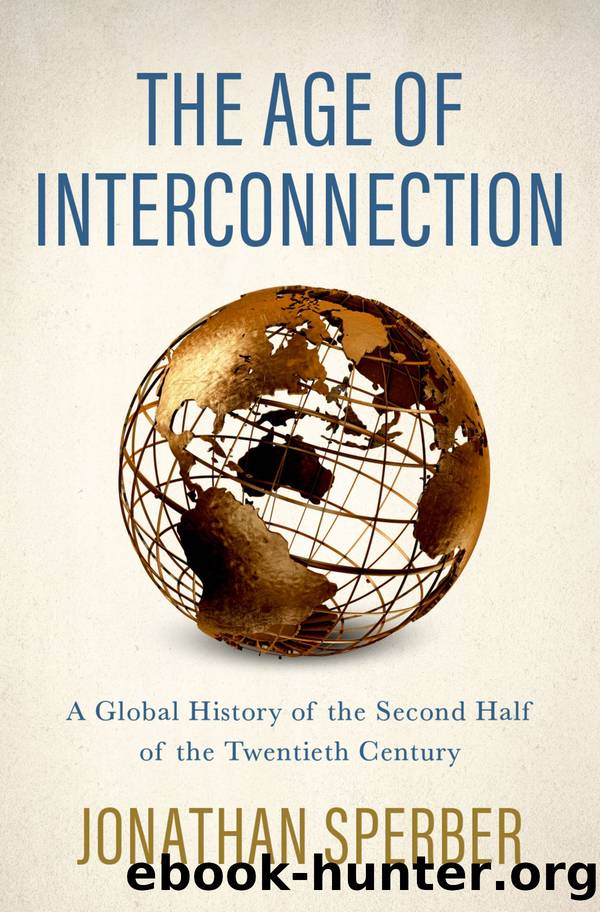The Age of Interconnection by Jonathan Sperber

Author:Jonathan Sperber
Language: eng
Format: epub
Publisher: Oxford University Press
Published: 2022-06-15T00:00:00+00:00
On Vacation
Television viewing and tourism are diametric opposites within the world of leisure. One is interwoven with everyday life; the other is a block of time, occurring at longer intervals, designed and experienced as an alternative to the quotidian. TV happens at home; tourism, by its very nature, requires traveling. Both involve experiencing the world. With television this is done by proxy as part of an alternate reality; with tourism, via direct physical experience of a different place.
If TVâs progress through the world in the Age of Interconnection has been accompanied by a drumbeat of cultural criticism, it seems positively muted in comparison to the cacophony of denigration directed at tourists. Tourism is widely and loudly decried as an activity lacking in authenticity. Tourists go out into the world to experience different landscapes, peoples, and cultures, but their presence invariably transforms their ostensibly exotic destinationâor, at least the parts of it they experienceâinto one whose inhabitants strive to make it like the touristsâ original home. In doing so, they subvert the whole point of the experience of something different, raising the question of whether that was what the tourists actually wanted in the first place. Some people, often self-designated as âtravelers,â rather than âtourists,â feeling the authenticity of previous destination has been spoiled, âoverrunâ by a mass of visitors, push on to less well-known, touristically undiscovered destinations. Of course, once purportedly more sophisticated travelers begin visiting a destination in larger numbers, tourists follow in their wake, so that the authentic destination is quickly transformed into precisely the inauthentic experiences travelers were fleeing.36 An expansion of this criticism is that tourists do not even pretend to want an authentic experience of a different cultural world, but desire their own in another location: eating at British and German pubs or Norwegian restaurants in Mallorca, searching Paris for an American-style hamburger, going to Paris to visit Euro-Disney, shopping for local souvenirs, mostly made in low-wage countries in Asia, traveling in bus tours with their fellows, hermetically sealed off from the countries the bus occasionally stops to visit, demanding wealthy-country standards of accommodations and refreshment in much poorer ones.
Even more sinister is the accusation that tourists are fundamentally destructive. They tactlessly show contempt for the people, countries, and cultures they are visiting, and by their presence threaten indigenous cultures. This is globalization at its most pernicious. Exploiting poorer peopleâs labor for their indulgent, inauthentic enjoyment, their presence is part of a transfer of wealth from local sourcesâusually understood as impoverished or marginalizedâto grasping multinational enterprises. Tourists and the investment they encourage to cater to them plays no small role in environmental degradation.37
Two quotes articulate this global disdain. As one Hawaiian activist put it in the 1980s, âThere are no innocent tourists.â A decade earlier, the Greek Orthodox Church actually devised a prayer, âLord Jesus Christ, Son of God, have mercy on the cities, the islands and the villages of this Orthodox Fatherland, as well as the holy monasteries which are scourged by the worldly touristic wave.
Download
This site does not store any files on its server. We only index and link to content provided by other sites. Please contact the content providers to delete copyright contents if any and email us, we'll remove relevant links or contents immediately.
Keeper of Genesis by Graham Hancock(1631)
Hieroglyphs: A Very Short Introduction by Penelope Wilson(1337)
The Road to Ubar by Nicholas Clapp(1180)
Rembrandt Drawings by Rembrandt(1143)
A Short History of the World in 50 Failures by Ben Gazur(1076)
The John Green Collection by Green John(1046)
Catching Fire: How Cooking Made Us Human by Richard Wrangham(999)
Forbidden Archeology's Impact: How a Controversial New Book Shocked the Scientific Community and Became an Underground Classic by Michael A. Cremo(984)
Hidden History: Lost Civilizations, Secret Knowledge, and Ancient Mysteries by Brian Haughton(903)
Primitive Mythology by Joseph Campbell(897)
The Creation of Inequality: How Our Prehistoric Ancestors Set the Stage for Monarchy, Slavery, and Empire by Kent Flannery & Joyce Marcus(873)
Hidden History by Jim Willis(869)
The History of Atlantis by Lewis Spence(812)
Neolithic by Susan McCarter(806)
Dinosaurs by Norman David;(805)
Searching for the Messiah by Barrie Wilson(784)
Ancient History from Coins by Howgego Christopher;(730)
The Ancient Giants Who Ruled America: The Missing Skeletons and the Great Smithsonian Cover-Up by Dewhurst Richard J(717)
The Christians Who Became Jews by Christopher Stroup;(713)
